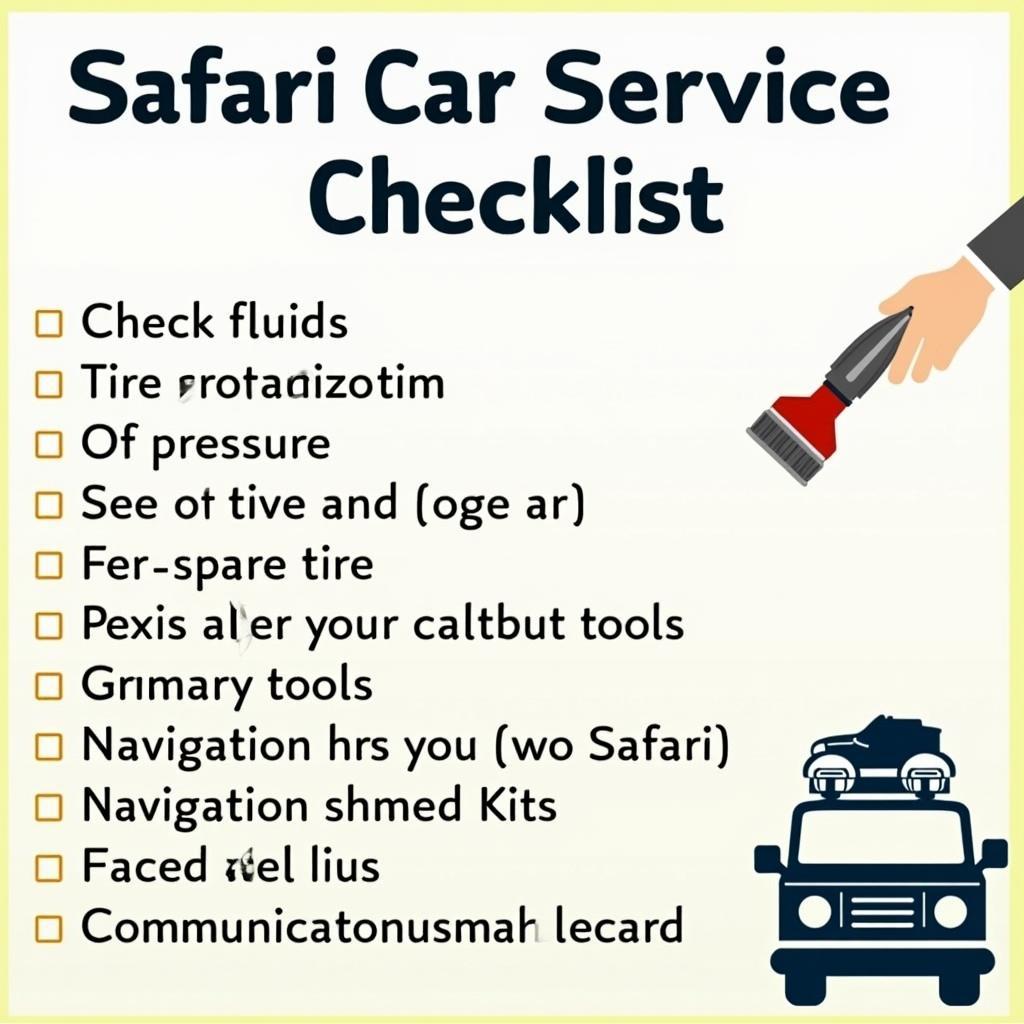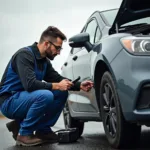When discussing in-safari 2.2 car service, understanding the necessary preparations and equipment is crucial for a smooth and safe journey. Whether you’re planning a self-drive adventure or relying on a professional safari operator, ensuring you have the right tools and knowledge can make all the difference. This article dives into the essentials for a successful safari 2.2 car service experience, covering everything from vehicle maintenance and emergency supplies to navigation and communication tools.
Essential Preparations for Safari 2.2 Car Service
Planning a safari in a 2.2-liter vehicle requires meticulous preparation. Before embarking on your adventure, a thorough vehicle inspection is paramount. Check all fluids, including engine oil, coolant, brake fluid, and power steering fluid. Ensure the tires are in excellent condition, properly inflated, and suitable for off-road driving. A spare tire, jack, and wheel brace are also essential. Furthermore, verify the functionality of all lights, including headlights, brake lights, indicators, and hazard lights.
Beyond vehicle mechanics, packing the right supplies is crucial. A well-stocked first-aid kit, including bandages, antiseptic wipes, pain relievers, and any personal medications, should be readily accessible. Insect repellent, sunscreen, and a hat are essential for protection against the elements. Carry plenty of drinking water and non-perishable food items, especially if venturing into remote areas. Finally, a comprehensive toolkit with basic tools, duct tape, and tire repair equipment can prove invaluable in unforeseen circumstances.
 Safari Car Service Checklist
Safari Car Service Checklist
Navigating the Wilderness: Essential Tools for Safari 2.2 Car Service
Navigating through unfamiliar terrain during a safari can be challenging. A reliable GPS device or a smartphone with offline maps is vital for staying on course. Familiarize yourself with the area’s topography and potential hazards before setting off. A compass and physical maps can also serve as backups in case of electronic device failure. Consider investing in a satellite phone or a two-way radio for communication in areas with limited or no cellular coverage.
“A good GPS is worth its weight in gold on safari,” advises seasoned safari guide, John Miller. “It not only helps you stay on track but can also mark points of interest and assist in emergency situations.”
Maintaining Your Vehicle During Safari 2.2 Car Service
Regular vehicle maintenance is crucial during a safari to prevent breakdowns and ensure a safe journey. Check fluid levels daily and top them off as needed. Inspect tires regularly for damage and maintain correct tire pressure. Clean the air filter frequently, as dusty conditions can quickly clog it. Be mindful of the terrain and drive cautiously to avoid damage to the vehicle’s undercarriage.
“Regular checks can prevent minor issues from escalating into major problems,” emphasizes automotive expert, Sarah Thompson. “A simple check of tire pressure or fluid levels can save you from being stranded in the middle of nowhere.”
Communication and Safety on Safari 2.2 Car Service
Maintaining communication during a safari is paramount for safety. Inform someone about your itinerary and expected return time. Carry a satellite phone or a two-way radio for communication in areas with limited cellular service. Be aware of local wildlife and follow safety guidelines provided by park authorities or your safari operator. Avoid driving at night, as this increases the risk of encountering wildlife. Always respect the environment and minimize your impact on the natural surroundings.
“Never underestimate the importance of communication on safari,” adds John Miller. “Being able to contact help in an emergency can be the difference between a minor inconvenience and a life-threatening situation.”
Conclusion
In conclusion, in safari 2.2 car service, proper planning, vehicle maintenance, and having the right tools are critical for a successful and enjoyable experience. By following these guidelines, you can ensure a smooth and memorable safari adventure.
FAQ
- What type of tires are recommended for safari 2.2 car service?
- What essential tools should I include in my toolkit for a safari?
- How can I ensure reliable communication in remote safari areas?
- What safety precautions should I take while driving on safari?
- What are the essential items to pack in a first-aid kit for a safari?
- How can I navigate effectively during a safari with a 2.2-liter vehicle?
- What are the recommended vehicle maintenance checks during a safari?
Need further assistance? Check out our articles on [link to related article 1] and [link to related article 2].
For immediate support, please contact us via WhatsApp: +1(641)206-8880, or Email: [email protected]. Our customer support team is available 24/7.

